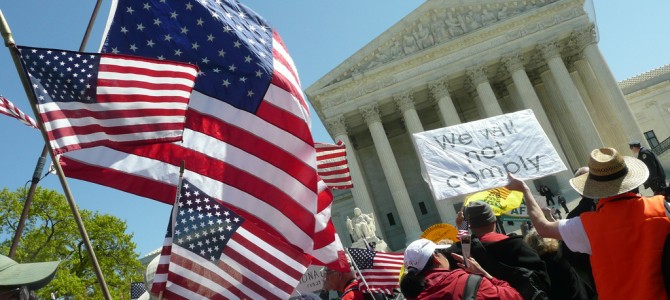Ahead of King v. Burwell oral arguments in the Supreme Court, an advocacy group called “Fix the Court” began running television ads urging the Supreme Court to broadcast its proceedings on television. There’s nothing wrong with the impulse for more transparency in government, but the idea that SCOTUS should open itself up to “the light of day” is not a very new one, or a very good one.
The question I often hear is: if we’ve been broadcasting congressional hearings and floor votes for decades, why not put the Supreme Court on C-SPAN?
Well, because there’s an important distinction between the legislative and judicial process. C-SPAN viewers can influence, and be influenced, by the things they see in our democratic institutions. Average voters can get a better idea of how politicians vote and conduct themselves in Washington. And those voters have the opportunity to impact the process by either pressuring their rep or attempting to change a politician’s mind – or even better, by voting them out of office.
None of these concerns are relevant to the Supreme Court. Justices don’t owe Americans instant access to oral arguments and they have no obligation to be transparent. In fact, the Supreme Court is intentionally shielded from the vagaries of democracy. And nothing democratizes something quite like mass media. So there really is no compelling reason for everyone to instantaneously see everything that goes on in the court.
Once cameras appear it would not only profoundly change the way the public views the court, but also the way presidents pick justices and the way those justices conduct themselves. Many judges will be more self-conscious about the public’s perception of them and many will be seduced to more grandstanding. And not only are the justices susceptible, but lawyers hoping to influence voters will have a new platform, as well.
Here’s how Justice Anthony Kennedy put it in 2007:
But I don’t think it’s in the best interest of our institution … Our dynamic works. The discussions that the justices have with the attorneys during oral arguments is a splendid dynamic. If you introduce cameras, it is human nature for me to suspect that one of my colleagues is saying something for a soundbite. Please don’t introduce that insidious dynamic into what is now a collegial court.
Now, obviously it’s only a textualist’s fantasy that justices can be free from external influences, but the idea that we should make more of a spectacle of the process – a place where questions and answers are taken out of context and thrown on YouTube so partisans can have conniptions – seems to work against the original intent of the court. It also strikes me that making big cases a television event will also make it easier for politics to influence the court. Justices already offer us their deliberations in detail. All of it is available online.
The Supreme Court’s job is to weigh the constitutionality of law, not to entertain us. If we agree on this – in theory at least – then the question we should be asking is: what good would cameras do?








